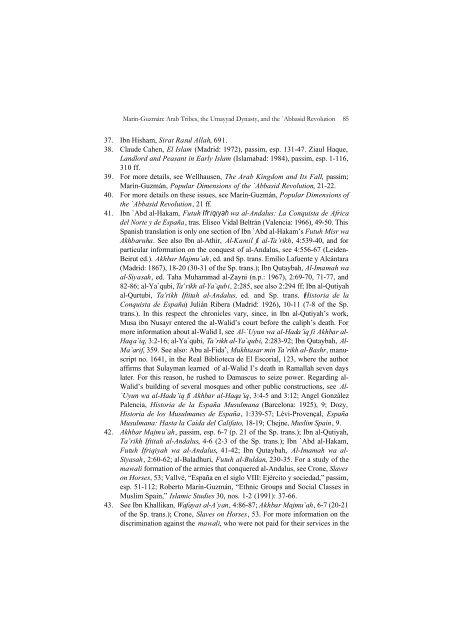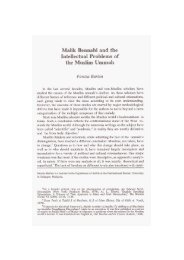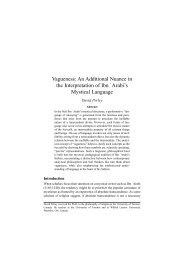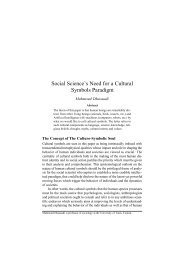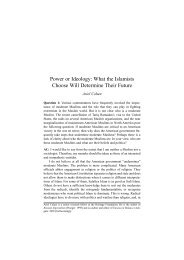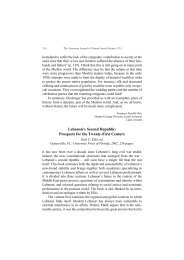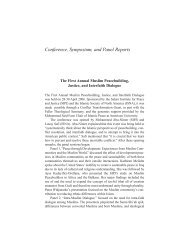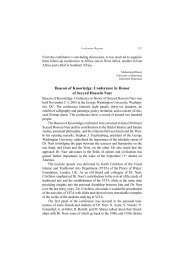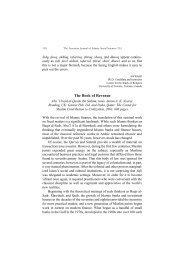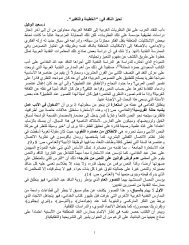Arab Tribes, the Umayyad Dynasty, and the `Abbasid ... - Epistemology
Arab Tribes, the Umayyad Dynasty, and the `Abbasid ... - Epistemology
Arab Tribes, the Umayyad Dynasty, and the `Abbasid ... - Epistemology
You also want an ePaper? Increase the reach of your titles
YUMPU automatically turns print PDFs into web optimized ePapers that Google loves.
Marín-Guzmán: <strong>Arab</strong> <strong>Tribes</strong>, <strong>the</strong> <strong>Umayyad</strong> <strong>Dynasty</strong>, <strong>and</strong> <strong>the</strong> <strong>`Abbasid</strong> Revolution 85<br />
37. Ibn Hisham, Sirat Rasul Allah, 691.<br />
38. Claude Cahen, El Islam (Madrid: 1972), passim, esp. 131-47. Ziaul Haque,<br />
L<strong>and</strong>lord <strong>and</strong> Peasant in Early Islam (Islamabad: 1984), passim, esp. 1-116,<br />
310 ff.<br />
39. For more details, see Wellhausen, The <strong>Arab</strong> Kingdom <strong>and</strong> Its Fall, passim;<br />
Marín-Guzmán, Popular Dimensions of <strong>the</strong> <strong>`Abbasid</strong> Revolution, 21-22.<br />
40. For more details on <strong>the</strong>se issues, see Marín-Guzmán, Popular Dimensions of<br />
<strong>the</strong> <strong>`Abbasid</strong> Revolution, 21 ff.<br />
41. Ibn `Abd al-Hakam, Futuh Ifriqiyah wa al-Andalus: La Conquista de Africa<br />
del Norte y de España, tras. Eliseo Vidal Beltrán (Valencia: 1966), 49-50. This<br />
Spanish translation is only one section of Ibn `Abd al-Hakam’s Futuh Misr wa<br />
Akhbaruha. See also Ibn al-Athir, Al-Kamil fi al-Ta’rikh, 4:539-40, <strong>and</strong> for<br />
particular information on <strong>the</strong> conquest of al-Andalus, see 4:556-67 (Leiden-<br />
Beirut ed.). Akhbar Majmu`ah, ed. <strong>and</strong> Sp. trans. Emilio Lafuente y Alcántara<br />
(Madrid: 1867), 18-20 (30-31 of <strong>the</strong> Sp. trans.); Ibn Qutaybah, Al-Imamah wa<br />
al-Siyasah, ed. Taha Muhammad al-Zayni (n.p.: 1967), 2:69-70, 71-77, <strong>and</strong><br />
82-86; al-Ya`qubi, Ta’rikh al-Ya`qubi, 2:285, see also 2:294 ff; Ibn al-Qutiyah<br />
al-Qurtubi, Ta’rikh Iftitah al-Andalus, ed. <strong>and</strong> Sp. trans. (Historia de la<br />
Conquista de España) Julián Ribera (Madrid: 1926), 10-11 (7-8 of <strong>the</strong> Sp.<br />
trans.). In this respect <strong>the</strong> chronicles vary, since, in Ibn al-Qutiyah’s work,<br />
Musa ibn Nusayr entered <strong>the</strong> al-Walid’s court before <strong>the</strong> caliph’s death. For<br />
more information about al-Walid I, see Al-`Uyun wa al-Hada’iq fi Akhbar al-<br />
Haqa’iq, 3:2-16; al-Ya`qubi, Ta’rikh al-Ya`qubi, 2:283-92; Ibn Qutaybah, Al-<br />
Ma`arif, 359. See also: Abu al-Fida’, Mukhtasar min Ta’rikh al-Bashr, manuscript<br />
no. 1641, in <strong>the</strong> Real Biblioteca de El Escorial, 123, where <strong>the</strong> author<br />
affirms that Sulayman learned of al-Walid I’s death in Ramallah seven days<br />
later. For this reason, he rushed to Damascus to seize power. Regarding al-<br />
Walid’s building of several mosques <strong>and</strong> o<strong>the</strong>r public constructions, see Al-<br />
`Uyun wa al-Hada’iq fi Akhbar al-Haqa’iq, 3:4-5 <strong>and</strong> 3:12; Angel González<br />
Palencia, Historia de la España Musulmana (Barcelona: 1925), 9; Dozy,<br />
Historia de los Musulmanes de España, 1:339-57; Lévi-Provençal, España<br />
Musulmana: Hasta la Caída del Califato, 18-19; Chejne, Muslim Spain, 9.<br />
42. Akhbar Majmu`ah, passim, esp. 6-7 (p. 21 of <strong>the</strong> Sp. trans.); Ibn al-Qutiyah,<br />
Ta’rikh Iftitah al-Andalus, 4-6 (2-3 of <strong>the</strong> Sp. trans.); Ibn `Abd al-Hakam,<br />
Futuh Ifriqiyah wa al-Andalus, 41-42; Ibn Qutaybah, Al-Imamah wa al-<br />
Siyasah, 2:60-62; al-Baladhuri, Futuh al-Buldan, 230-35. For a study of <strong>the</strong><br />
mawali formation of <strong>the</strong> armies that conquered al-Andalus, see Crone, Slaves<br />
on Horses, 53; Vallvé, “España en el siglo VIII: Ejército y sociedad,” passim,<br />
esp. 51-112; Roberto Marín-Guzmán, “Ethnic Groups <strong>and</strong> Social Classes in<br />
Muslim Spain,” Islamic Studies 30, nos. 1-2 (1991): 37-66.<br />
43. See Ibn Khallikan, Wafayat al-A`yan, 4:86-87; Akhbar Majmu`ah, 6-7 (20-21<br />
of <strong>the</strong> Sp. trans.); Crone, Slaves on Horses, 53. For more information on <strong>the</strong><br />
discrimination against <strong>the</strong> mawali, who were not paid for <strong>the</strong>ir services in <strong>the</strong>


